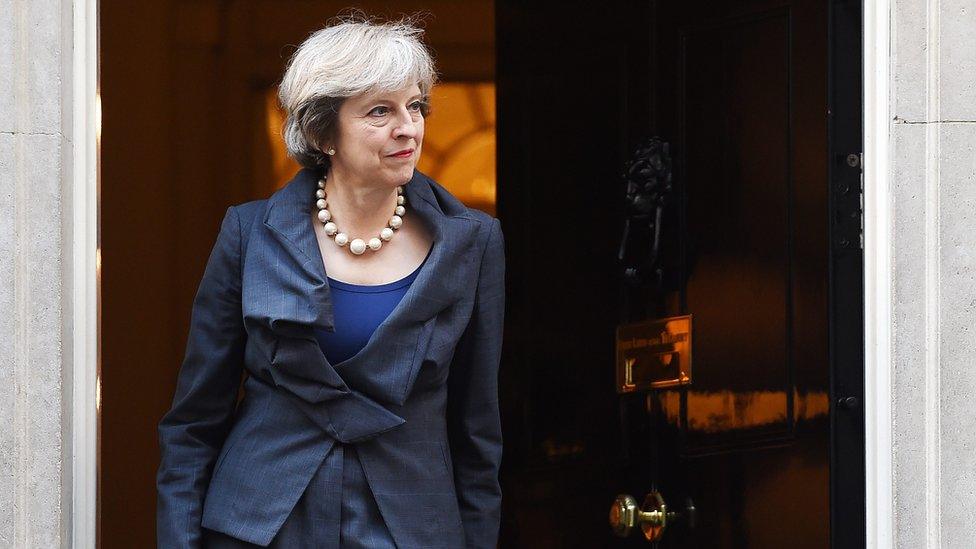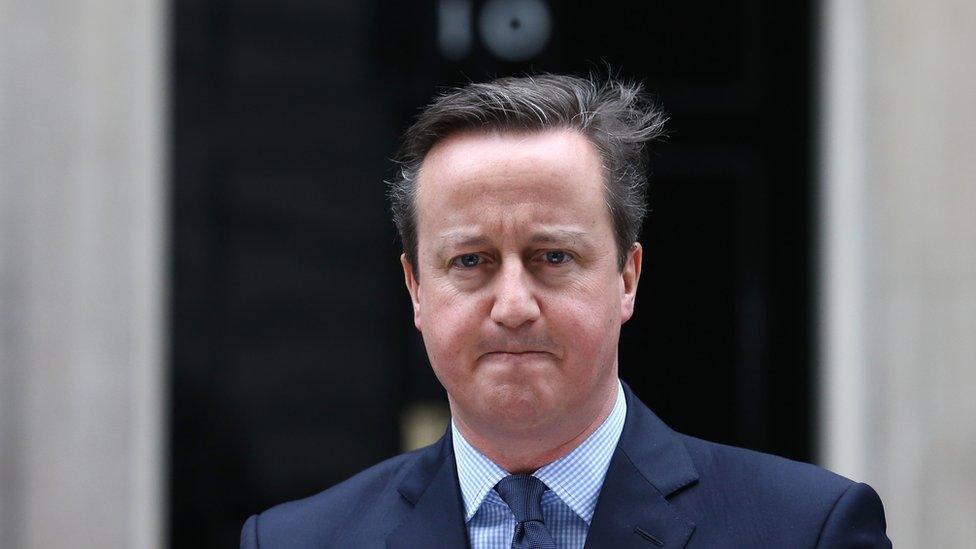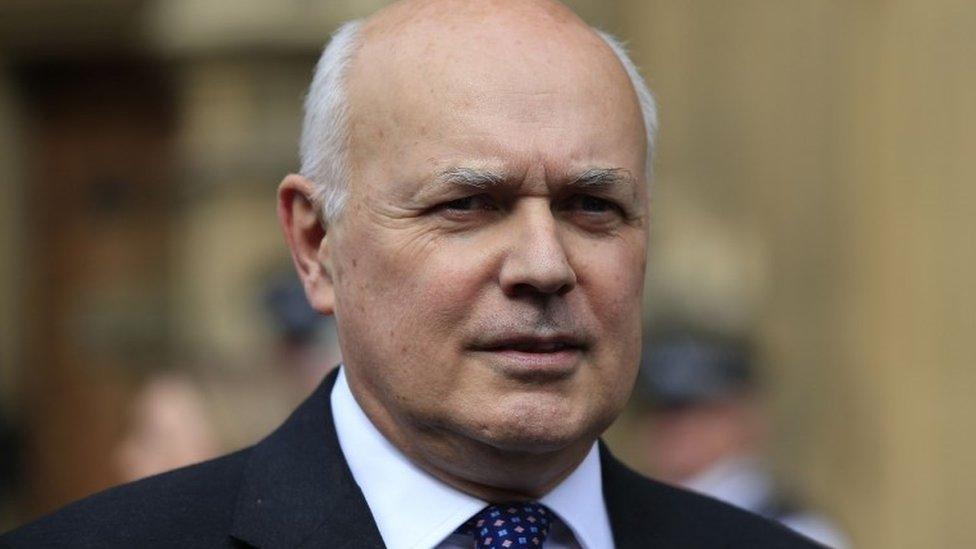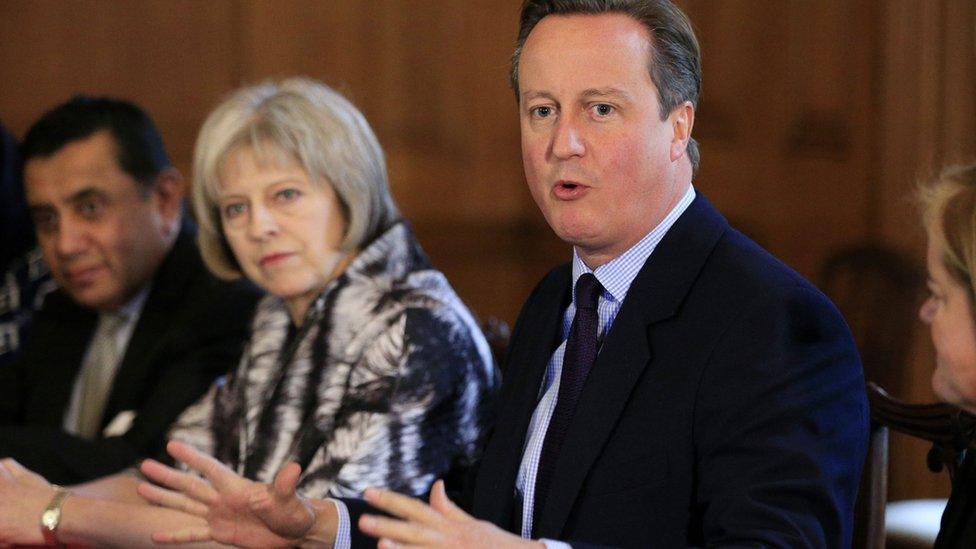Theresa May camp hits back at 'lily-livered' immigration claims
- Published

Sources close to Theresa May have hit back at claims she was branded "lily-livered" by former PM David Cameron over proposed EU immigration controls.
A new book claimed the then home secretary failed to support plans to curb EU immigrants coming into Britain.
It claims Mrs May urged Mr Cameron not to demand an "emergency brake" in 2014 for fear of upsetting other EU leaders.
But supporters of the prime minister say she wrote to Mr Cameron twice to make the case for such a measure.
Iain Watson, BBC political correspondent, said sources close to Mrs May had now taken the "unusual step" of releasing details of private correspondence between her and Mr Cameron.
Our correspondent said those close to Mrs May had calculated it is "politically important to rebut the suggestion that she took a softer line on immigration".
According to the book - All Out War, by Sunday Times political editor Tim Shipman - Mr Cameron had wanted to push for a so-called emergency brake as part of his EU renegotiation.
Such a measure could have convinced voters he would be able to reduce immigration if Britain remained in the EU, it argued.
However, the book claims the former prime minister was persuaded against doing so by Mrs May and then foreign secretary Philip Hammond, now the chancellor.

Analysis, BBC deputy political editor John Pienaar
"Lily-livered May" are not words Downing Street wants to see in the same headline in a national newspaper. Not ever.
Seeing them as the prime minister embarks on a nerve-testing game of chicken with European leaders, as she tries to negotiate new relationships outside the EU, was guaranteed to have Theresa May and her team choking on their cornflakes.
Team May could simply not afford to leave unchallenged the suggestion she baulked at the idea of seeking an "emergency brake" on EU migration for fear of upsetting the German chancellor.
Satisfying the public demand for a tough line on migration - the single greatest influence underlying the vote to leave the EU - will be tough enough. Any suspicion the prime minister lacks the stomach for the fight could make that task far harder.
So the rebuttal was swift.

Mrs May feared demanding such a measure would upset German Chancellor Angela Merkel, it says.
Mr Shipman quoted an aide to Mr Cameron as saying: "Hammond spoke first and argued we just couldn't do something that would receive an immediate raspberry in Europe.
"Theresa said very, very little, and simply said that we just couldn't go against Merkel."
The book said a "visibly deflated" Mr Cameron was said to have turned to one official and said: "I can't do it without their support. If it wasn't for my lily-livered cabinet colleagues...."

However, according to details released by Mrs May's camp, she twice wrote to Mr Cameron - in November 2014 and May 2015 - arguing for an emergency brake.
The first letter came a week before Mr Cameron was due to give a key speech on Europe.
In it, she is said to have proposed an emergency brake as part of a series of measures to rebalance the rights of citizens to move within the EU.
Sources said she argued it would allow national governments to act in the best interests of their resident populations.
'Wholly consistent'
In the second letter, she is said to have argued that an emergency brake was crucial to cutting numbers and convincing the public the government was capable of policing its own borders.
Sources close to the prime minister have defended their decision to release details of the letters, but said they would not be publishing them.
One source told the BBC: "We are not going to attempt to justify our media strategy. We are very happy to explain the facts."
They also pointed to articles from 2013 and 2014 in which Mrs May called for reforms to freedom of movement.
Speaking to BBC Radio 4's Today programme, Tim Shipman said his account was based on the testimony of two aides to Mr Cameron.
He added: "Everything Downing Street are putting out is wholly consistent with what I've written and they are not in any way disputing the details of what happened in that meeting."
Second Brexit book
It comes after a second book - by former Downing Street director of communications Sir Craig Oliver - claimed Mr Cameron felt "badly let down" by Mrs May during the EU referendum campaign.
Sir Craig said the former home secretary failed to back the Remain campaign 13 times and was regarded by some as "an enemy agent".
However, former Conservative leader Iain Duncan Smith urged Remain campaigners to "get behind Theresa May instead of carping".
"Craig Oliver's is one of a growing number of foolish attempts by ex-government Remainers who lost to shift responsibility for their failure.
"The grown-up thing for them to do, instead of carping, is to show some humility and get behind Theresa May as she seeks to get back control of migration with the EU as we leave," he said in a statement.
- Published25 September 2016

- Published25 September 2016
